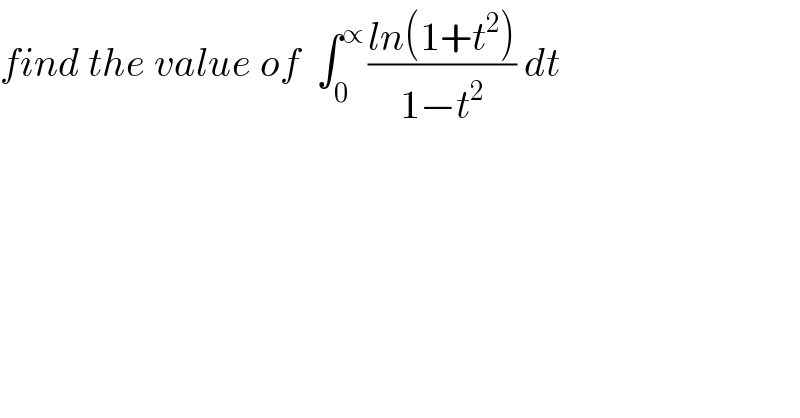Question Number 27181 by abdo imad last updated on 02/Jan/18

$${find}\:{the}\:{value}\:{of}\:\:\int_{\mathrm{0}} ^{\propto\:} \frac{{ln}\left(\mathrm{1}+{t}^{\mathrm{2}} \right)}{\mathrm{1}−{t}^{\mathrm{2}} }\:{dt} \\ $$
Commented by abdo imad last updated on 08/Jan/18
![let use the ch. t=(1/x) I= −∫_0 ^∞ ((ln(1+(1/x^2 )))/(1− (1/x^2 ))) ((−dx)/x^2 ) = ∫_0 ^∞ ((ln(1+x^2 ) −2lnx)/(x^2 −1))dx =−∫_0 ^∞ ((ln(1+x^2 ))/(1−x^2 ))dx +2∫_0 ^∞ ((lnx)/(1−x^2 ))dx ⇒2I= 2 ∫_0 ^∞ ((lnx)/(1−x^2 ))dx ⇒I= ∫_0 ^∞ ((lnx)/(1−x^2 ))dx=∫_0 ^1 ((lnx)/(1−x^2 )) + ∫_1 ^∝ ((lnx)/(1−x^2 ))dx the ch.x=(1/u) give ∫_1 ^∝ ((lnx)/(1−x^2 )) dx= −∫_0 ^1 ((−lnu)/(1−(1/u^2 ))) ((−du)/u^2 ) =−∫_0 ^1 ((lnu)/(u^2 −1))du=∫_0 ^1 ((lnu)/(1−u^2 ))du ⇒I= 2∫_0 ^1 ((lnx)/(1 −x^2 ))dx I= 2 ∫_0 ^1 ( Σ_(n=0) ^∝ x^(2n) )lnx dx I= 2 Σ_(n=0) ^∝ ∫_0 ^1 x^(2n) lnxdx intrgrstion by psrts ∫_0 ^1 x^(2n) lnxdx=[ (1/(2n+1)) x^(2n+1) lnx]_0 ^1 − ∫_0 ^1 (x^(2n) /(2n+1))dx =− (1/((2n+1)^2 )) I= −2 Σ_(n=0) ^∝ (1/((2n+1)^2 ))=−2.(π^2 /8) I= −(π^2 /4) .](https://www.tinkutara.com/question/Q27508.png)
$${let}\:{use}\:{the}\:{ch}.\:{t}=\frac{\mathrm{1}}{{x}} \\ $$$${I}=\:−\int_{\mathrm{0}} ^{\infty} \:\frac{{ln}\left(\mathrm{1}+\frac{\mathrm{1}}{{x}^{\mathrm{2}} }\right)}{\mathrm{1}−\:\frac{\mathrm{1}}{{x}^{\mathrm{2}} }}\:\frac{−{dx}}{{x}^{\mathrm{2}} } \\ $$$$=\:\int_{\mathrm{0}} ^{\infty} \:\:\frac{{ln}\left(\mathrm{1}+{x}^{\mathrm{2}} \right)\:−\mathrm{2}{lnx}}{{x}^{\mathrm{2}} \:−\mathrm{1}}{dx} \\ $$$$=−\int_{\mathrm{0}} ^{\infty} \:\frac{{ln}\left(\mathrm{1}+{x}^{\mathrm{2}} \right)}{\mathrm{1}−{x}^{\mathrm{2}} }{dx}\:+\mathrm{2}\int_{\mathrm{0}} ^{\infty} \frac{{lnx}}{\mathrm{1}−{x}^{\mathrm{2}} }{dx} \\ $$$$\Rightarrow\mathrm{2}{I}=\:\mathrm{2}\:\int_{\mathrm{0}} ^{\infty} \:\frac{{lnx}}{\mathrm{1}−{x}^{\mathrm{2}} }{dx} \\ $$$$\Rightarrow{I}=\:\int_{\mathrm{0}} ^{\infty} \:\:\frac{{lnx}}{\mathrm{1}−{x}^{\mathrm{2}} }{dx}=\int_{\mathrm{0}} ^{\mathrm{1}} \frac{{lnx}}{\mathrm{1}−{x}^{\mathrm{2}} }\:+\:\int_{\mathrm{1}} ^{\propto} \frac{{lnx}}{\mathrm{1}−{x}^{\mathrm{2}} }{dx} \\ $$$${the}\:{ch}.{x}=\frac{\mathrm{1}}{{u}}\:{give} \\ $$$$\int_{\mathrm{1}} ^{\propto} \frac{{lnx}}{\mathrm{1}−{x}^{\mathrm{2}} }\:{dx}=\:−\int_{\mathrm{0}} ^{\mathrm{1}} \:\frac{−{lnu}}{\mathrm{1}−\frac{\mathrm{1}}{{u}^{\mathrm{2}} }}\:\frac{−{du}}{{u}^{\mathrm{2}} } \\ $$$$=−\int_{\mathrm{0}} ^{\mathrm{1}} \:\frac{{lnu}}{{u}^{\mathrm{2}} −\mathrm{1}}{du}=\int_{\mathrm{0}} ^{\mathrm{1}} \:\:\frac{{lnu}}{\mathrm{1}−{u}^{\mathrm{2}} }{du} \\ $$$$\Rightarrow{I}=\:\mathrm{2}\int_{\mathrm{0}} ^{\mathrm{1}} \frac{{lnx}}{\mathrm{1}\:−{x}^{\mathrm{2}} }{dx} \\ $$$${I}=\:\mathrm{2}\:\int_{\mathrm{0}} ^{\mathrm{1}} \left(\:\sum_{{n}=\mathrm{0}} ^{\propto} \:{x}^{\mathrm{2}{n}} \right){lnx}\:{dx} \\ $$$${I}=\:\mathrm{2}\:\sum_{{n}=\mathrm{0}} ^{\propto} \int_{\mathrm{0}} ^{\mathrm{1}} {x}^{\mathrm{2}{n}} {lnxdx}\:{intrgrstion}\:{by}\:{psrts} \\ $$$$\int_{\mathrm{0}} ^{\mathrm{1}} \:{x}^{\mathrm{2}{n}} {lnxdx}=\left[\:\frac{\mathrm{1}}{\mathrm{2}{n}+\mathrm{1}}\:{x}^{\mathrm{2}{n}+\mathrm{1}} {lnx}\right]_{\mathrm{0}} ^{\mathrm{1}} −\:\overset{\mathrm{1}} {\int}_{\mathrm{0}} \frac{{x}^{\mathrm{2}{n}} }{\mathrm{2}{n}+\mathrm{1}}{dx} \\ $$$$=−\:\frac{\mathrm{1}}{\left(\mathrm{2}{n}+\mathrm{1}\right)^{\mathrm{2}} } \\ $$$${I}=\:−\mathrm{2}\:\sum_{{n}=\mathrm{0}} ^{\propto} \:\:\frac{\mathrm{1}}{\left(\mathrm{2}{n}+\mathrm{1}\right)^{\mathrm{2}} }=−\mathrm{2}.\frac{\pi^{\mathrm{2}} }{\mathrm{8}} \\ $$$${I}=\:−\frac{\pi^{\mathrm{2}} }{\mathrm{4}}\:\:. \\ $$
